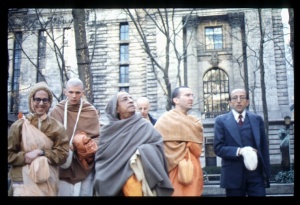CC Madhya 19.19 (1975)

A.C. Bhaktivedanta Swami Prabhupada
TEXT 19
- pātsāha dekhiyā sabe sambhrame uṭhilā
- sambhrame āsana diyā rājāre vasāilā
SYNONYMS
pātsāha dekhiyā—seeing the Nawab; sabe—all of them; sambhrame—in great respect; uṭhilā—stood up; sambhrame—with great respect; āsana diyā—giving a sitting place; rājāre—the King; vasāilā—made to sit.
TRANSLATION
As soon as all the brāhmaṇas and Sanātana Gosvāmī saw the Nawab appear, they all stood up and respectfully gave him a sitting place to honor him.
PURPORT
Although Nawab Hussain Shah was a mleccha-yavana, he was nonetheless the governor of the country, and the learned scholars and Sanātana Gosvāmī offered him all the respect due a king or a governor. When a person occupies an exalted executive post, one should consider that he has acquired the grace of the Lord. In Bhagavad-gītā it is said:
- yad yad vibhūtimat sattvaṁ
- śrīmad ūrjitam eva vā
- tat tad evāvagaccha tvaṁ
- mama tejo 'ṁśa-saṁbhavam
"Know that all beautiful, glorious and mighty creations spring from but a spark of My splendor." (Bg. 10.41)
Whenever we see something exalted, we must consider it part of the power of the Supreme Personality of Godhead. A powerful man (vibhūtimat sattvam) is one who has obtained the grace of the Lord or has derived some power from Him. In Bhagavad-gītā (7.10) Kṛṣṇa says, tejas tejasvinām aham: "I am the power of the powerful." The learned brāhmaṇa scholars showed respect to Nawab Hussain Shah because he represented a fraction of Kṛṣṇa's power.